2005年普通高等学校招生全国统一考试——英语(北京卷)
- 格式:doc
- 大小:1.23 MB
- 文档页数:15
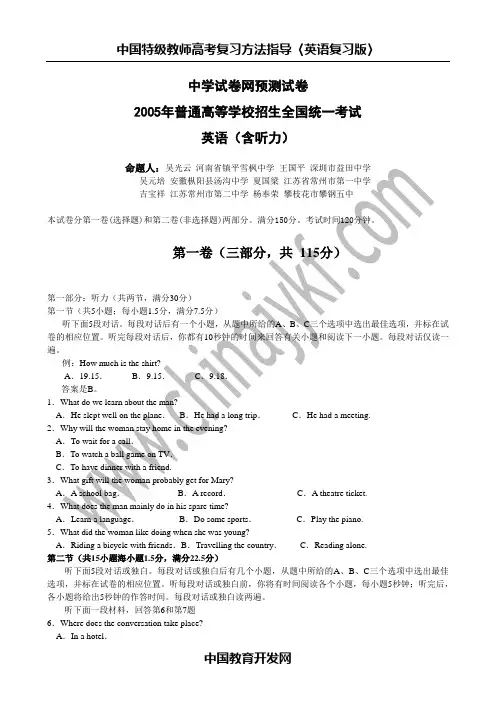
中学试卷网预测试卷2005年普通高等学校招生全国统一考试英语(含听力)命题人:吴光云河南省镇平雪枫中学王国平深圳市益田中学吴元培安徽枞阳县汤沟中学夏国梁江苏省常州市第一中学吉宝祥江苏常州市第二中学杨奉荣攀枝花市攀钢五中本试卷分第一卷(选择题)和第二卷(非选择题)两部分。
满分150分。
考试时间120分钟。
第一卷(三部分,共 115分)第一部分:听力(共两节,满分30分)第一节(共5小题;每小题1.5分,满分7.5分)听下面5段对话。
每段对话后有一个小题,从题中所给的A、B、C三个选项中选出最佳选项,并标在试卷的相应位置。
听完每段对话后,你都有10秒钟的时间来回答有关小题和阅读下一小题。
每段对话仅读一遍。
例:How much is the shirt?A.19.15.B.9.15.C.9.18.答案是B。
1.What do we learn about the man?A.He slept well on the plane.B.He had a long trip.C.He had a meeting.2.Why will the woman stay home in the evening?A.To wait for a call.B.To watch a ball game on TV.C.To have dinner with a friend.3.What gift will the woman probably get for Mary?A.A school bag.B.A record.C.A theatre ticket.4.What does the man mainly do in his spare time?A.Learn a language.B.Do some sports.C.Play the piano.5.What did the woman like doing when she was young?A.Riding a bicycle with friends.B.Travelling the country.C.Reading alone.第二节(共15小题海小题1.5分,满分22.5分)听下面5段对话或独白。
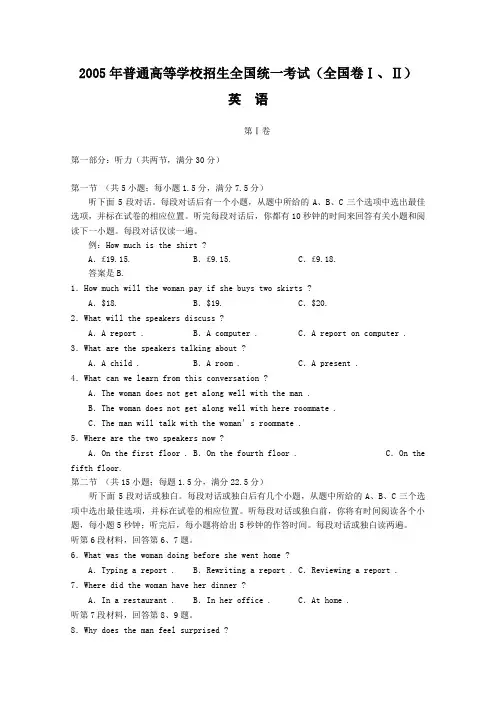
2005年普通高等学校招生全国统一考试(全国卷Ⅰ、Ⅱ)英语第Ⅰ卷第一部分:听力(共两节,满分30分)第一节(共5小题;每小题1.5分,满分7.5分)听下面5段对话。
每段对话后有一个小题,从题中所给的A、B、C三个选项中选出最佳选项,并标在试卷的相应位置。
听完每段对话后,你都有10秒钟的时间来回答有关小题和阅读下一小题。
每段对话仅读一遍。
例:How much is the shirt ?A.£19.15. B.£9.15. C.£9.18.答案是B.1.How much will the woman pay if she buys two skirts ?A.$18. B.$19. C.$20.2.What will the speakers discuss ?A.A report . B.A computer . C.A report on computer . 3.What are the speakers talking about ?A.A child . B.A room . C.A present .4.What can we learn from this conversation ?A.The woman does not get along well with the man .B.The woman does not get along well with here roommate .C.T he man will talk with the woman’s roommate .5.Where are the two speakers now ?A.On the first floor . B.On the fourth floor . C.On the fifth floor.第二节(共15小题;每题1.5分,满分22.5分)听下面5段对话或独白。
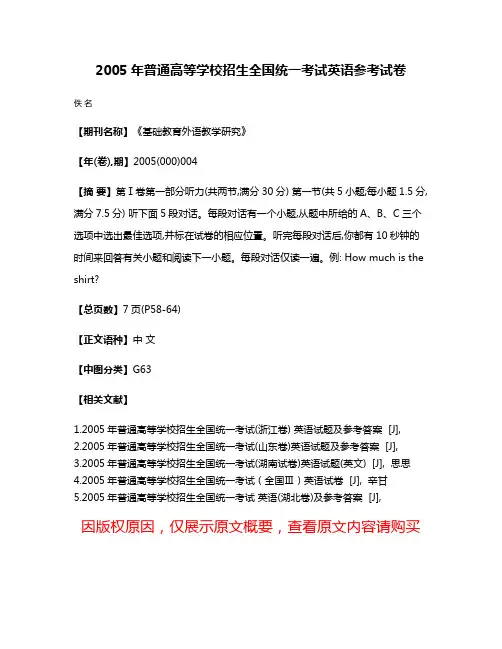
2005年普通高等学校招生全国统一考试英语参考试卷
佚名
【期刊名称】《基础教育外语教学研究》
【年(卷),期】2005(000)004
【摘要】第Ⅰ卷第一部分听力(共两节,满分30分) 第一节(共5小题;每小题1.5分,满分7.5分) 听下面5段对话。
每段对话有一个小题,从题中所给的A、B、C三个选项中选出最佳选项,并标在试卷的相应位置。
听完每段对话后,你都有10秒钟的时间来回答有关小题和阅读下一小题。
每段对话仅读一遍。
例: How much is the shirt?
【总页数】7页(P58-64)
【正文语种】中文
【中图分类】G63
【相关文献】
1.2005年普通高等学校招生全国统一考试(浙江卷) 英语试题及参考答案 [J],
2.2005年普通高等学校招生全国统一考试(山东卷)英语试题及参考答案 [J],
3.2005年普通高等学校招生全国统一考试(湖南试卷)英语试题(英文) [J], 思思
4.2005年普通高等学校招生全国统一考试(全国Ⅲ)英语试卷 [J], 辛甘
5.2005年普通高等学校招生全国统一考试英语(湖北卷)及参考答案 [J],
因版权原因,仅展示原文概要,查看原文内容请购买。
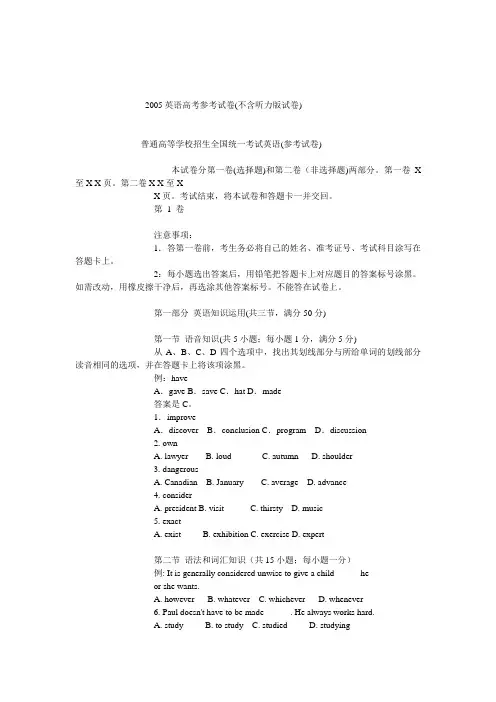
2005英语高考参考试卷(不含听力版试卷)普通高等学校招生全国统一考试英语(参考试卷)本试卷分第一卷(选择题)和第二卷(非选择题)两部分。
第一卷X 至X X页。
第二卷X X至XX页。
考试结束,将本试卷和答题卡一并交回。
第1 卷注意事项:1.答第一卷前,考生务必将自己的姓名、准考证号、考试科目涂写在答题卡上。
2:每小题选出答案后,用铅笔把答题卡上对应题目的答案标号涂黑。
如需改动,用橡皮擦干净后,再选涂其他答案标号。
不能答在试卷上。
第一部分英语知识运用(共三节,满分50分)第一节语音知识(共5小题;每小题1分,满分5分)从A、B、C、D四个选项中,找出其划线部分与所给单词的划线部分读音相同的选项,并在答题卡上将该项涂黑。
例:haveA.gave B.save C.hat D.made答案是C。
1.improveA.discover B.conclusion C.program D.discussion2. ownA. lawyerB. loudC. autumnD. shoulder3. dangerousA. CanadianB. JanuaryC. averageD. advance4. considerA. presidentB. visitC. thirstyD. music5. exactA. existB. exhibitionC. exerciseD. expert第二节语法和词汇知识(共15小题;每小题一分)例: It is generally considered unwise to give a child______heor she wants.A. howeverB. whateverC. whicheverD. whenever6. Paul doesn't have to be made______. He always works hard.A. studyB. to studyC. studiedD. studying7. I first met Lisa three years ago when we______at a radiostation together.A. have workedB. had been workingC. were workingD. had worked8. She thought I was talking about her daughter,______, infact, I was talking about my daughter.A. whomB. whereC. whichD. while9. --When shall we meet again?-- Make it______day you like; it's all the same to me.A. oneB. anyC. anotherD. some10. All the leading newspapers______the trade talks betweenChina and the United States.A. reportedB. printedC. announcedD. published11. You don't need to describe her. I______her several times.A. had metB. have metC. metD. meet12. How beautifully she stings! I have never heard_____.A. the better voiceB. a good voiceC. the best voiceD. a better voice13. -- I'll be away on a business trip. Would you mind lookingafter my cat?-- Not at all.A. I've no timeB. I'd rather notC. You can leaveD. I'd be happy to14. In some parts of the world, tea______ with milk and sugar.A. is servingB. is servedC. servesD. served15. It's nearly seven o'clock. Jack______be here at any moment.A. mustB. needC. shouldD. can16. I hope there are enough glasses for each guest tohave_____.A. itB. thoseC. themD. one17. ______down the radio --- the baby's asleep in the nextroom.A. TurnB. TurningC. TurnedD. To turn18. It was not until 1920 ______ regular radio broadcastsbegan.A. whenB. whichC. thatD. since19. The boy wanted to ride his bicycle in the street, but hismother told him_____.A. not toB. not to doC. not do itD. do not20. Would you like a cup of coffee first______shall we getdown tobusiness right away?A. thenB. whenC. orD. otherwise第三节完形填空(共20小题;每小题1.5分,满分30分)阅读下面短文,从短文后所给各题的四个选项(A、B、C和D)中,选出可以填入空白处的最佳选项,并在答题卡上将该项涂黑。
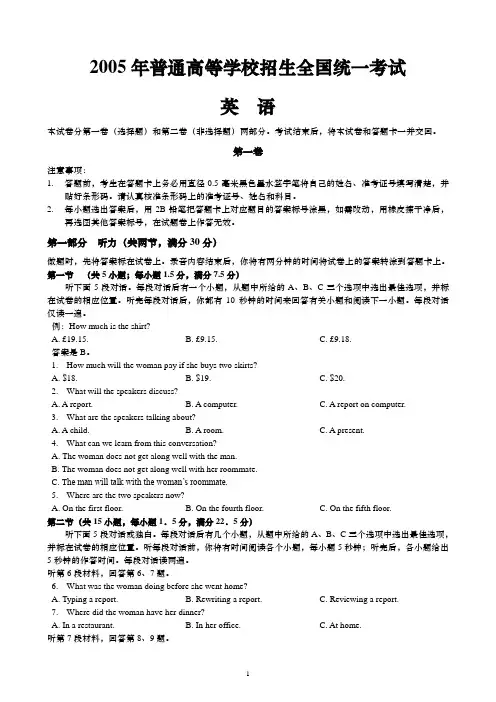
2005年普通高等学校招生全国统一考试英语本试卷分第一卷(选择题)和第二卷(非选择题)两部分。
考试结束后,将本试卷和答题卡一并交回。
第一卷注意事项:1.答题前,考生在答题卡上务必用直径0.5毫米黑色墨水签字笔将自己的姓名、准考证号填写清楚,并贴好条形码。
请认真核准条形码上的准考证号、姓名和科目。
2.每小题选出答案后,用2B铅笔把答题卡上对应题目的答案标号涂黑,如需改动,用橡皮擦干净后,再选图其他答案标号,在试题卷上作答无效。
第一部分听力(共两节,满分30分)做题时,先将答案标在试卷上。
录音内容结束后,你将有两分钟的时间将试卷上的答案转涂到答题卡上。
第一节(共5小题;每小题1.5分,满分7.5分)听下面5段对话。
每段对话后有一个小题,从题中所给的A、B、C三个选项中选出最佳选项,并标在试卷的相应位置。
听完每段对话后,你都有10秒钟的时间来回答有关小题和阅读下一小题。
每段对话仅读一遍。
例:How much is the shirt?A. £19.15.B. £9.15.C. £9.18.答案是B。
1.How much will the woman pay if she buys two skirts?A. $18.B. $19.C. $20.2.What will the speakers discuss?A. A report.B. A computer.C. A report on computer.3.What are the speakers talking about?A. A child.B. A room.C. A present.4.What can we learn from this conversation?A. The woman does not get along well with the man.B. The woman does not get along well with her roommate.C. T he man will talk with the woman’s roommate.5.Where are the two speakers now?A. On the first floor.B. On the fourth floor.C. On the fifth floor.第二节(共15小题,每小题1.5分,满分22.5分)听下面5段对话或独白。
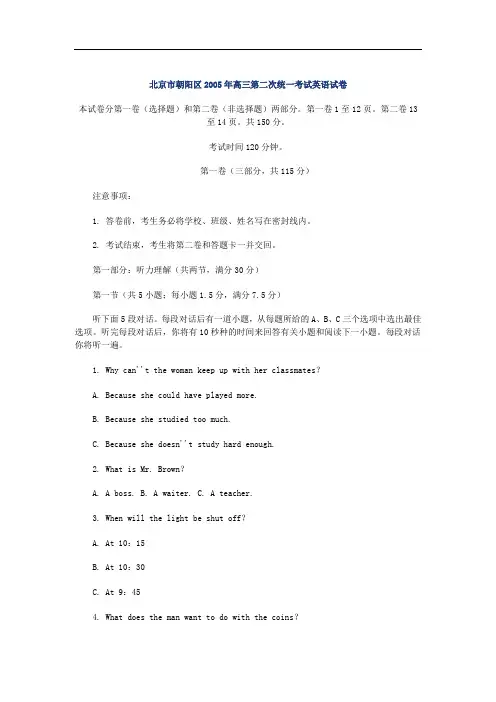
北京市朝阳区2005年高三第二次统一考试英语试卷本试卷分第一卷(选择题)和第二卷(非选择题)两部分。
第一卷1至12页。
第二卷13至14页。
共150分。
考试时间120分钟。
第一卷(三部分,共115分)注意事项:1. 答卷前,考生务必将学校、班级、姓名写在密封线内。
2. 考试结束,考生将第二卷和答题卡一并交回。
第一部分:听力理解(共两节,满分30分)第一节(共5小题;每小题1.5分,满分7.5分)听下面5段对话。
每段对话后有一道小题,从每题所给的A、B、C三个选项中选出最佳选项。
听完每段对话后,你将有10秒种的时间来回答有关小题和阅读下一小题。
每段对话你将听一遍。
1. Why can''t the woman keep up with her classmates?A. Because she could have played more.B. Because she studied too much.C. Because she doesn''t study hard enough.2. What is Mr. Brown?A. A boss.B. A waiter.C. A teacher.3. When will the light be shut off?A. At 10:15B. At 10:30C. At 9:454. What does the man want to do with the coins?A. To lend them to the woman.B. To make a phone call.C. To use them for bus fare.5. In which city did the woman and John stay the longest?A. Paris.B. Rome.C. Vienna.第二节(共15小题;每小题1.5分,满分22.5分)听下面5段对话或独白。
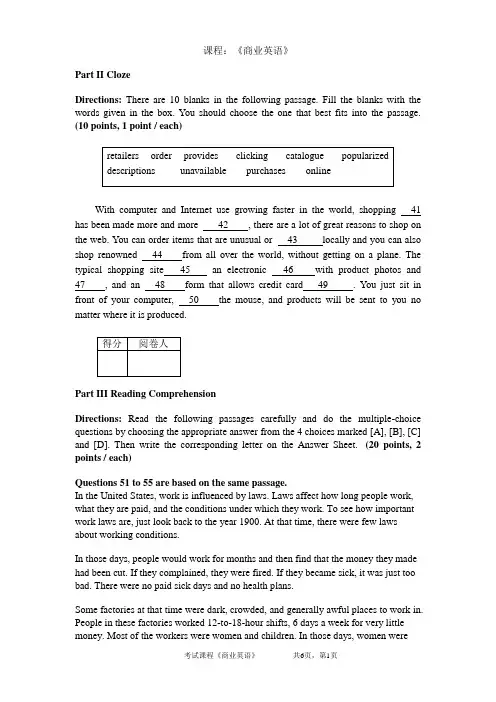
课程:《商业英语》Part II ClozeDirections:There are 10 blanks in the following passage. Fill the blanks with the words given in the box. You should choose the one that best fits into the passage.(10 points, 1 point / each)With computer and Internet use growing faster in the world, shopping 41 has been made more and more 42 , there are a lot of great reasons to shop on the web. You can order items that are unusual or 43 locally and you can also shop renowned 44 from all over the world, without getting on a plane. The typical shopping site 45 an electronic 46 with product photos and 47 , and an 48 form that allows credit card 49 . You just sit in front of your computer, 50 the mouse, and products will be sent to you no matter where it is produced.Part III Reading ComprehensionDirections:Read the following passages carefully and do the multiple-choice questions by choosing the appropriate answer from the 4 choices marked [A], [B], [C] and [D]. Then write the corresponding letter on the Answer Sheet. (20 points, 2 points / each)Questions 51 to 55 are based on the same passage.In the United States, work is influenced by laws. Laws affect how long people work, what they are paid, and the conditions under which they work. To see how important work laws are, just look back to the year 1900. At that time, there were few laws about working conditions.In those days, people would work for months and then find that the money they made had been cut. If they complained, they were fired. If they became sick, it was just too bad. There were no paid sick days and no health plans.Some factories at that time were dark, crowded, and generally awful places to work in. People in these factories worked 12-to-18-hour shifts, 6 days a week for very little money. Most of the workers were women and children. In those days, women weregenerally paid half of what men were paid for doing exactly the same work. Children were given even less, so naturally, factory owners preferred hiring children. There were no health or safety laws to protect the workers. People fainted from the heat and lack of air.It took a very sad event to start getting changes. That sad event was the Triangle Fire. In 1911, the Triangle Building in New York City caught fire. The building was a dangerous place. Still, 145 people would not have died if the factory owner had not locked the doors. He did not want his workers to waste time by going outside to rest, so he locked them in. During the fire, a number of young women jumped out of the windows and died on the street. The others died inside.As a result, some important safety and health laws were passed. Now there are also laws to prevent child labor and laws to make sure that there is equal pay for equal work. Among other things, there is a limit to the number of hours in the workday and there is a minimum amount that workers must be paid.51. In America, _________________.A. laws have little influence on workB. people couldn't work without lawsC. people couldn't work without lawsD. people can change laws easily52. In the old days, if workers made complaints, they would ___________.A. have their health plans taken awayB. find their money cutC. lose their jobsD. be given terrible places to work53. Factory owners preferred hiring children because _____________.A. children eat lessB. they could manage children betterC. children could do adults' workD. they paid children much less money54. Some changes took place as a result of _____________.A. a traffic accidentB. a serious diseaseC. the death of many workers in a fireD. a strike by the workers55. Now there are laws for all of the following except ___________.A. allowing workers to take holidaysB. preventing children from being employedC. making sure that there is equal pay for equal workD. limiting work hoursQuestions 56 to 60 are based on the same passage or dialog.I used to go to Starbucks (星巴克) for their coffee, but that's changed since I discovered their comforting, tasty teas, which are better than coffee any time. Tea iscool even when it's hot. People drink more tea than any other drink in the world, except for water.Whether it's served hot or cold, natural and flavored teas are drinks that have been consumed (消费) for centuries. Everywhere you look, you'll find various kinds of teas―in restaurants, grocery stores, television adverti sements, and gift shops.Why is there all this excitement about tea? What's its attraction? Well, there are many possibilities for why more and more people are drinking tea. One possibility is that people are coming to notice the benefits of drinking tea, particularly green tea. Studies show that drinking four cups of green tea a day can reduce the risk of developing various types of cancer, as well as heart disease. The key to tea's effects of cure seems to lie in chemicals found in tea which prevent a process that leads to the growth of cancers. Green tea may also prevent skin cancer. It has also been linked with helping the body to rid itself of harmful materials, and green tea is thought to possibly protect against colds and Parkinson's (帕金森) disease.Another explanation for why people are drinking more tea may be due to the comforting process of just making a cup of tea. The time it takes to prepare tea leaves in hot water and enjoy its gentle flavor forces drinkers to slow down and relax a while, making it the perfect way to improve a world where people are so crazy about cappuccino(热牛奶咖啡), a hot coffee with milk in it.So, whether you drink tea, eat it in foods, wear it to smell good, or take it in pills, one thing is certain, the use of tea is more than a trend―it is a habit of our past and if studies prove the benefit of its use, it will undoubtedly be an important element of our future.56. Nowadays, among all the drinks in the world, tea is __________.A. the most widely consumed drinkB. as widespread as coffeeC. even more widely consumed than waterD. the second most widely consumed drink57. The passage does not mention __________ as a possible benefit of drinking tea.A. preventing skin cancerB. helping the body to rid itself of harmful materialC. curing Parkinson's diseaseD. reducing the risk of developing cancer58. It is good to drink tea because the time it takes to prepare a cup of tea _________.A. allows the tea leaves to absorb enough waterB. enables drinkers to relaxC. is suitable for people to get some newsD. can improve the quality of cappuccino59. The writer suggests that in the future people will probably ___________.A. follow the trend and go on drinking teaB. drink more water than teaC. form the habit of eating tea leaves in foodsD. take tea as an important part of their life60. The passage is mainly about ____________.A. the benefits of drinking teaB. the benefits of drinking coffeeC. using tea leaves in fortune tellingD. advising people to drink tea and waterPart IV TranslationDirections: Translate the following paragraph into Chinese. (10 points)Advertising is an essential factor in modern business methods. We can scarcely pass a day without being forced to look at the advertisements which stare at us from TV , magazines, newspapers and the billboards. The origins of advertising lie thousands of years in the past. But before speaking about it, we first should define the term advertising: It is mass communication an advertiser pays for in order to convince a certain segment of the public to adopt ideas or take actions of benefit to the advertiser. One of the first known methods of advertising was an outdoor display, usually an eye-catching sign painted on the wall of a building.Part V Answer questionsDirections: Answer the questions below according to the passage you have learned. (20 points)61. What are Wal-Mart ’s sales strategies?62. Tell the definition of green food.63. What are the three hot spots for China ’s consumers?64. What are the chief objectives of the China Consumer ’s Association?北京科技经营管理学院 20 11 -20 12 学年第 二 学期毕业清考试卷答题纸 课程:《商业英语》学号: ○○○○○○○※※※※Part I: Vocabulary (40 points )Section ASection BPart II Cloze (10 points)41. 42. 43. 44. 45.46. 47. 48. 49. 50.Part III Reading Comprehension (20 points)51. 52. 53. 54. 55.56. 57. 58. 59. 60.Part IV Translation (10 points)Part V Answer questions (20 points)Directions: Answer the questions below according to the passage you have learned.61. What are Wal-Mart’s sales strategies?62. Tell the definition of green food.63. What are the three hot spots for China’s consumers?64. What are the chief objectives of the China Consumer’s Association?。
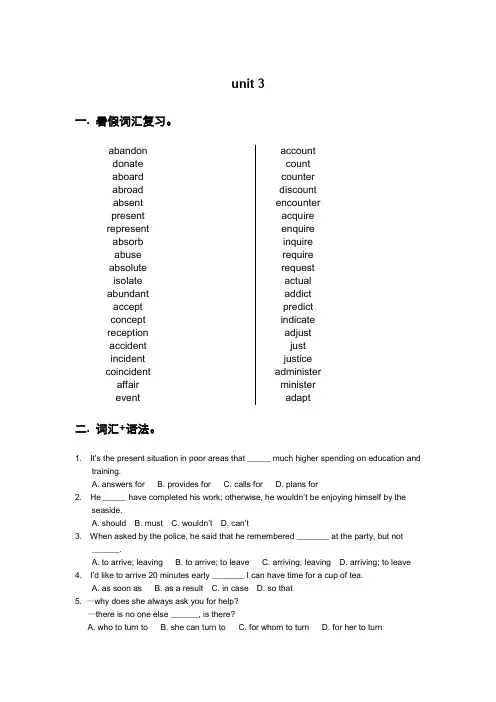
unit3一. 暑假词汇复习。
abandon accountdonate countaboard counterabroad discountabsent encounterpresent acquirerepresent enquireabsorb inquireabuse requireabsolute requestisolate actualabundant addictaccept predictconcept indicatereception adjustaccident justincident justicecoincident administeraffair ministerevent adapt二. 词汇+语法。
1. It’s the present situation in poor areas that _____ much higher spending on education and training.A. answers forB. provides forC. calls forD. plans for2. He _____ have completed his work; otherwise, he wouldn’t be enjoying himself by the seaside.A. shouldB. mustC. wouldn’tD. can’t3. When asked by the police, he said that he remembered _______ at the party, but not______.A. to arrive; leavingB. to arrive; to leaveC. arriving; leavingD. arriving; to leave4. I’d like to arrive 20 minutes early _______ I can have time for a cup of tea.A. as soon asB. as a resultC. in caseD. so that5. —why does she always ask you for help?—there is no one else ______, is there?A. who to turn toB. she can turn toC. for whom to turnD. for her to turn三. 词汇+完形。
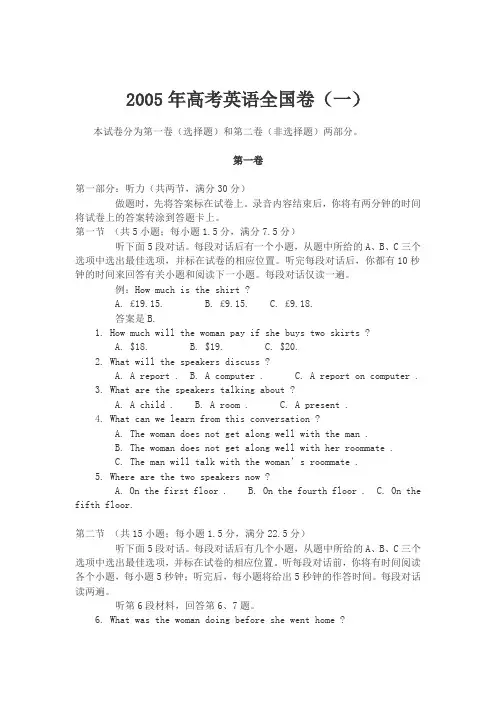
2005年高考英语全国卷(一)本试卷分为第一卷(选择题)和第二卷(非选择题)两部分。
第一卷第一部分:听力(共两节,满分30分)做题时,先将答案标在试卷上。
录音内容结束后,你将有两分钟的时间将试卷上的答案转涂到答题卡上。
第一节(共5小题;每小题1.5分,满分7.5分)听下面5段对话。
每段对话后有一个小题,从题中所给的A、B、C三个选项中选出最佳选项,并标在试卷的相应位置。
听完每段对话后,你都有10秒钟的时间来回答有关小题和阅读下一小题。
每段对话仅读一遍。
例:How much is the shirt ?A. £19.15.B. £9.15.C. £9.18.答案是B.1. How much will the woman pay if she buys two skirts ?A. $18.B. $19.C. $20.2. What will the speakers discuss ?A. A report .B. A computer .C. A report on computer .3. What are the speakers talking about ?A. A child .B. A room .C. A present .4. What can we learn from this conversation ?A. The woman does not get along well with the man .B. The woman does not get along well with her roommate .C. The man will talk with the woman’s roommate .5. Where are the two speakers now ?A. On the first floor .B. On the fourth floor .C. On the fifth floor.第二节(共15小题;每小题1.5分,满分22.5分)听下面5段对话。
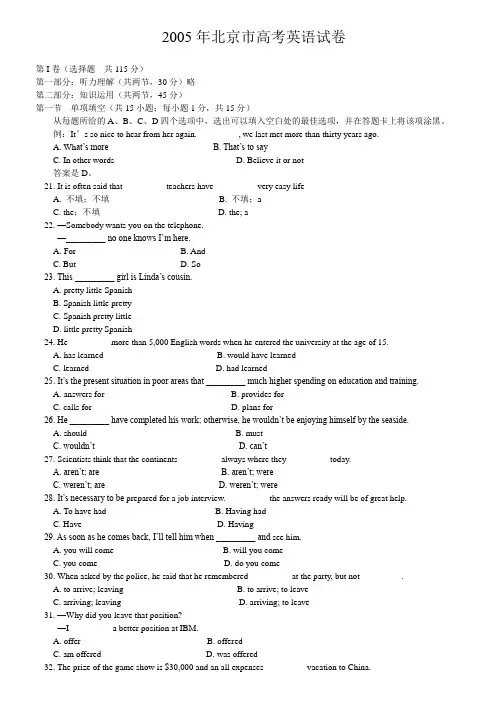
2005年北京市高考英语试卷第I卷(选择题共115分)第一部分:听力理解(共两节,30分)略第二部分:知识运用(共两节,45分)第一节单项填空(共15小题;每小题1分,共15分)从每题所给的A、B、C、D四个选项中,选出可以填入空白处的最佳选项,并在答题卡上将该项涂黑。
例:It’s so nice to hear from her again. _________, we last met more than thirty years ago.A. Wh at’s moreB. That’s to sayC. In other wordsD. Believe it or not答案是D。
21. It is often said that _________ teachers have _________ very easy lifeA. 不填;不填B. 不填;aC. the;不填D. the; a22. —Somebody wants you on the telephone.—_________ no one knows I’m here.A. ForB. AndC. ButD. So23. This _________ girl is Linda’s cousin.A. pretty little SpanishB. Spanish little prettyC. Spanish pretty littleD. little pretty Spanish24. He _________ more than 5,000 English words when he entered the university at the age of 15.A. has learnedB. would have learnedC. learnedD. had learned25. It’s the present situation in poor areas that _________ much higher spending on education and training.A. answers forB. provides forC. calls forD. plans for26. He _________ have completed his work; otherwise, he wouldn’t be enjoying himself by the seaside.A. shouldB. mustC. wouldn’tD. can’t27. Scientists think that the continents _________ always where they _________ today.A. aren’t; areB. aren’t; wereC. weren’t; areD. weren’t; were28. It’s necessary to be prepared for a job interview. _________ the answers ready will be of great help.A. To have hadB. Having hadC. HaveD. Having29. As soon as he comes back, I’ll tell him when _________ and see him.A. you will comeB. will you comeC. you comeD. do you come30. When asked by the police, he said that he remembered _________ at the party, but not _________.A. to arrive; leavingB. to arrive; to leaveC. arriving; leavingD. arriving; to leave31. —Why did you leave that position?—I _________ a better position at IBM.A. offerB. offeredC. am offeredD. was offered32. The prize of the game show is $30,000 and an all expenses _________ vacation to China.A. payingB. paidC. to be paidD. being paid33. I’d like to arrive 20 minutes early _________ I can have time for a cup of tea.A. as soon asB. as a resultC. in caseD. so that34. I couldn’t do my homework with all that noise _________.A. going onB. goes onC. went onD. to go on35. —Why does she always ask you for help?—There is no one else _________, is there?A. who to turn toB. she can turn toC. for whom to turnD. for her to turn第二节完形填空(共20小题;每小题1.5分,共30分)阅读下面短文,掌握其大意,从每题所给的A、B、C、D四个选项中,选出最佳选项Dear Laura,I just heard you tell an old story of gift giving and unselfish love in your program. You doubted that such unselfish love would happen in today’s world. Well, I’m here to give you ___36___.I wanted to do something very ___37___ for my fifteen-year-old son, who has always been the perfect child. He ___38___ all summer to earn enough money to buy a used motorcycle. Then, he spent hours and hours on it ___39___ it looked almost new. I was so ___40___ of him that I bought him the shiniest helmet and a riding outfit.I could ___41___ wait for him to open up his gift. In fact, I barely slept the night before. Upon awakening, I went to the kitchen to ___42___ the coffee, tea, and morning goodies. In the living room was a beautiful keyboard with a ___43___: “To my wonderful mother, all my love, your son.”I was so ___44___. It had been a long-standing joke in our family that I wanted a piano so that I could ___45___ lessons. “Learn to play the piano, and I’ll get you one” was my husband’s ___46___.I stood there shocked, crying a river, asking myself how my son could ___47___ this expensive gift.Of course, the ___48___ awoke, and my son was thrilled(激动的)with my reaction. Many kisses were ___49___, and I immediately wanted him to ___50___ my gift.As he saw the helmet and outfit, the look on his face was not ___51___ what I was expecting. Then I ___52___ that he had sold the motorcycle to get me the keyboard.Of course I was the proudest mother ___53___ on that day, and my feet never hit the ground for a month.So I wanted you to know, that kind of love still ___54___ and lives even in the ever-changing world of me, me, me!I thought you’d love to ___55___ this story.Yours,HilaryP. S. The next day, my husband and I bought him a new “used” already shiny motorcycle.36. ()A. hope B. advice C. support D. courage37. ()A. polite B. similar C. special D. private38. ()A. played B. studied C. traveled D. worked39. ()A. after B. before C. unless D. until40. ()A. sure B. fond C. proud D. confident41. ()A. perhaps B. really C. almost D. hardly42. ()A. start B. cook C. set D. serve43. ()A. note B. notice C. word D. sign44. ()A. disturbed B. confused C. astonished D. inspired45. ()A. give B. take C. draw D. teach46. ()A. reason B. request C. comment D. response47. ()A. present B. afford C. find D. order48. ()A. neighbor B. building C. home D. house49. ()A. exchanged B. experienced C. expected D. exhibited50. ()A. tear B. open C. check D. receive51. ()A. purely B. basically C. obviously D. exactly52. ()A. realized B. remembered C. imagined D. supposed53. ()A. only B. still C. ever D. even54. ()A. works B. exists C. matters D. counts55. ()A. send B. publish C. share D. write第三部分:阅读理解(共20小题;每小题2分,共40分)阅读下列短文,从每题所给的A、B、C、D四个选项中,选出最佳选项.AChancesI really love my job because I enjoy working with small children and like the challenges and awards from the job. I also think my work is important. There was a time when I thought I would never have that sort of career(职业).I wasn’t an excellent student because I didn’t do much schoolwork. In my final term I started thinking what I might do and found I didn’t have much to offer. I just accepted that I wasn’t the type to have a career.I then found myself a job, looking after two little girls. It wasn’t too bad at first. But the problems began when I agreed to live in, so that I would be there if my boss had to go out for business in the evening. We agreed that if I had to work extra hours one week, she’d give me time off the next. But unfortunately, it didn’t often work out. I was getting extremely tired and fed up, because I had too many late nights and early mornings with the children.One Sunday, I was in the park with the children, and met Megan who used to go to school with me. I told her about my situation. She suggested that I should do a course and get a qualification(资格证书)if I wanted to work with children. I didn’t think I wou ld be accepted because I didn’t take many exam s in school. She persuaded me to phone the local college and they were really helpful. My experience counted for a lot and I got on a part-time course. I had to leave my job with the family, and got work helping out at a kindergarten.Now I’ve got a fu ll-time job there. I shall always be thankful to Megan. I wish I had known earlier that you could have a career, even if you aren’t top of the class at school.56. What is the author’s present job?A. Working part-time in a college.B. Taking care of children for a family.C. Helping children with their schoolwork.D. Looking after children at a kindergarten.57. When staying with the two girls’ family, the author ___________.A. was paid for extra workB. often worked long hoursC. got much help from her bossD. took a day off every other week58. Why did the author leave her first job?A. She found a full-time job.B. She was fed up with children.C. She decided to attend a part-time course.D. She needed a rest after working extra hours.59. What has the author learned from her own experiences?A. Less successful students can still have a career.B. Qualifications are necessary for a career.C. Hard work makes an excellent student.D. One must choose the job she likes.BGood tool design is important in the prevention of overuse injuries. Well-designed tools and equipment will require less force to operate them and prevent awkward(别扭的)hand positions. They will allow the worker to keep the elbows(肘)next to the body to prevent damage to the shoulder and arm.Overuse injuries can therefore be prevented or reduced if the employer provides, and workers use:·power tools rather than having to use muscle(肌肉)power·tools with specially designed handles that allow the wrist(手腕)to keep straight (See Figure 1). This means that hands and wrists are kept in the same position as they would be if they were hanging relaxed at a person’s sideFigure 1. Bend the tool, not the wrist·tools with handles that can be held comfortably by the whole hand. This means having a selection of sizes —remember that tools that provide a comfortable firm hold for a person with a very large hand may be awkward for someone with a very small hand. This is a particularly important consideration for women who may use tools originally designed for men·tools that do not press fingers (or flesh) between the handles, and whose handles do not have sharp edges or a small surface area.60. What is the best title for the passage?A. Good Tool Design for WomenB. Importance of Good Tool DesignC. Tool Design and Prevention of InjuriesD. Overuse of Tools and Worker Protection61. Which of the following describes a well-designed tool?A. It’s kept close to the body.B. It fully uses muscle power.C. It makes users feel relaxed.D. It’s operated with less force.62. What is Figure 1 used to show?A. The effective use of the tool.B. The way of operating the tool.C. The proper design of the handle.D. The purpose of bending the wrist.63. In choosing tools for women, ___________ of the handle is the most important.A. the sizeB. the edgeC. the shapeD. the positionCHow could we possibly think that keeping animals in cages in unnatural environments —mostly for entertainment purposes—is fair and respectful?Zoo officials say they are concerned about animals. However, most zoos remain “Collections”of interesting “things”rather than protective habitats(栖息地). Zoos teach people that it is acceptable to keep animals bored, lonely, and far from their natural homes.Zoos claim (声称)to educate people and save endangered species(物种), but visitors leave zoos without having learned anything meaningful about the animals’natural behavior, intelligence, or beauty. Zoos keep animals in small spaces or cages, and most signs only mention the species’name, diet, and natural range(分布区). The animals’normal behavior is seldom noticed because zoos don’t usually take care of the animals’natural needs.The animals are kept together in small spaces, with no privacy and little opportunity for mental and physical exercise. This results in unusual and self-destructive behavior called zoochosis. A worldwide study of zoos found that zoochosis is common among animals kept in small spaces or cages. Another study showed that elephants spend 22 percent of their time making repeated head movements or biting cage bars, and bears spend 30 percent of their time walking back and forth, a sign of unhappiness and pain.Furthermore, most animals in zoos are not endangered Captive breeding(圈养繁殖)of endangered big cats, Asian elephants, and other species has not resulted in their being sent back to the wild. Zoos talk a lot about their captive breeding programs because they do not want people to worry about a species dying out. In fact, baby animals also attract a lot of paying customers. Haven’t we seen enough competitions to name baby animals?Actually, we will save endangered species only if we save their habitats and put an end to the reasons people kill them. Instead of suppo rting zoos, we should support groups that work to protect animals’ natural habitats.64. How would the author describe the animals’ life in zoos?A. dangerous.B. Unhappy.C. Natural.D. Easy.65. In the state of zoochosis, animals ___________.A. remain in cagesB. behave strangelyC. attack other animalsD. enjoy moving around66. What does the author try to argue in the passage?A. Zoos are not worth the public support.B. Zoos fail in their attempt to save animals.C. Zoos should treat animals as human beings.D. Zoos use animals as a means of entertainment.67. The author tries to persuade readers to accept his argument mainly by ___________.A. pointing out the faults in what zoos doB. using evidence he has collected at zoosC. questioning the way animals are protectedD. discussing the advantages of natural habitats68. Although he argues against zoos, the author would still agree that ___________.A. zoos have to keep animals in small cagesB. most animals in zoos are endangered speciesC. some endangered animals are reproduced in zoosD. it’s acceptable to keep animals away from their habitatsDLanguage as a System of SymbolsOf all systems of symbols (符号), language is the most highly developed. It has been pointed out that human beings, by agreement, can make anything stand for anything. Human beings have agreed, in the course of centuries of mutual(相互的)dependency, to let the various noises that they can produce with their lungs, throats, tongues, teeth, and lips systematically stand for certain happenings in their nervous systems. We call that system of agreements language.There is no necessary connection between the symbol and that which it stands for. Just as social positions can be symbolized by feathers worn on the head, by gold on the watch chain, or by a thousand other things according to the culture we live in, so the fact of being hungry can be symbolized by a thousand different noises according to the culture we live in.However obvious these facts may appear at first glance, they are actually not so obvious as they seem except when we take special pains to think about the subject. Symbols and the things they stand for are independent of each other, yet we all have a way of feeling as if, and sometimes acting as if, there were necessary connections. For example, there are people who feel that foreign languages are unreasonable by nature: foreigners have such funny names for things, and why can’t they call things by their right names? This feeling exhibits itself most strongly in those English and American tourists who seem to believe that they can make the natives of any country understand English if they shout loud enough. Like the little boy who is reported to have said: “Pigs are called pigs because they are such dirty animals,”they feel that the symbol is inherently (内在地)connected in some way with the things symbolized.69. Language is a highly developed system of symbols because human beings ___________.A. have made use of language for centuriesB. use our nervous systems to support languageC. have made various noises stand for any eventsD. can make anything stand for anything by agreement70. What can we conclude from Paragraph 2?A. Different noises may mean different things.B. Our culture determines what a symbol stands for.C. The language we use symbolizes our social positions.D. Our social positions determine the way we are dressed.71. In Paragraph 3, “take special pains” probably means “___________”.A. try very hardB. take our timeC. are very unhappyD. feel especially painful72. The example of the little boy is used to show that ___________.A. adults often learn from their youngB. “pig” is a dirty word because pigs are dirtyC. words are not connected with the things they stand forD. people sometimes have wrong ideas about how language workspavement:人行道swerve:突然转向insurance保险73. What does Passage ①tell us about the boy?A. He was injured in the head when he was 14.B. He has waited for the payout for a long time.C. He has lived in the same place since the accident.D. He was run over by a taxi when riding on the pavement.74. What can we learn about Lee and Collier counties from Passage ②?A. They both became safe places.B. They won the same place in a race.C. They had the same number of accidents.D. They joined hands in reducing accidents.75. Which passage would give more information on the prevention of road accidents?A. ①B. ②C. ③D. ④第II卷(共35分)[注意事项]1. 用钢笔或圆珠笔直接答在试卷上。
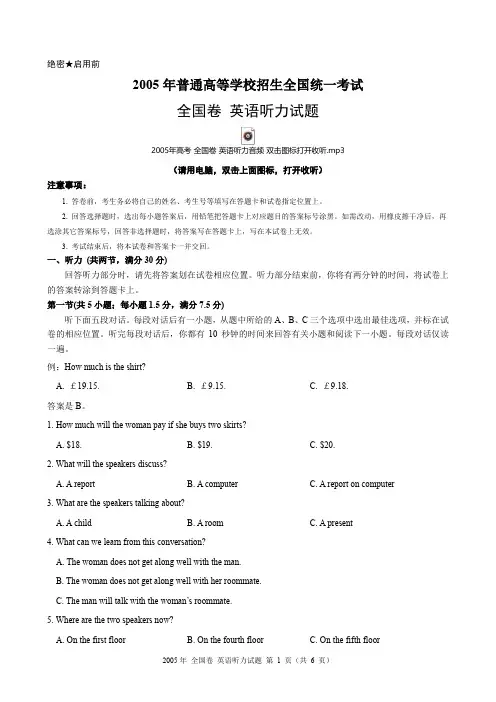
绝密★启用前2005年普通高等学校招生全国统一考试全国卷英语听力试题2005年高考 全国卷 英语听力音频 双击图标打开收听.mp3(请用电脑,双击上面图标,打开收听)注意事项:1. 答卷前,考生务必将自己的姓名、考生号等填写在答题卡和试卷指定位置上。
2. 回答选择题时,选出每小题答案后,用铅笔把答题卡上对应题目的答案标号涂黑。
如需改动,用橡皮擦干净后,再选涂其它答案标号,回答非选择题时,将答案写在答题卡上,写在本试卷上无效。
3. 考试结束后,将本试卷和答案卡一并交回。
一、听力(共两节,满分30分)回答听力部分时,请先将答案划在试卷相应位置。
听力部分结束前,你将有两分钟的时间,将试卷上的答案转涂到答题卡上。
第一节(共5小题;每小题1.5分,满分7.5分)听下面五段对话。
每段对话后有一小题,从题中所给的A、B、C三个选项中选出最佳选项,并标在试卷的相应位置。
听完每段对话后,你都有10秒钟的时间来回答有关小题和阅读下一小题。
每段对话仅读一遍。
例:How much is the shirt?A. £19.15.B. £9.15.C. £9.18.答案是B。
1. How much will the woman pay if she buys two skirts?A. $18.B. $19.C. $20.2. What will the speakers discuss?A. A reportB. A computerC. A report on computer3. What are the speakers talking about?A. A childB. A roomC. A present4. What can we learn from this conversation?A. The woman does not get along well with the man.B. The woman does not get along well with her roommate.C. The man will talk with the woman’s roommate.5. Where are the two speakers now?A. On the first floorB. On the fourth floorC. On the fifth floor第二节(共15小题;每小题1. 5分,满分22. 5分)听下面5段对话。
北京卷英语参考答案:第一部分:听力理解(共两节,30分)第一节(共5小题;每小题1.5分,共7.5分)1. C2. A3. B4. C5. C第二节(共15小题;每小题1.5分,共22.5分)6. A7. B8. A9. C10. A11. B12. A13. A14. B15. A16. B17. C18. B19. C20. B第二部分:知识运用(共两节,45分)第一节:单项填空(共15小题;每小题1分,共15分)21. B22. C23. A24. D25. C26. B27. C28. D29. A30. C31. D32. B33. D34. A第二节:完形填空(共20小题;每小题1.5分,共30分)36. A37. C38. D39. D40. C41. D42. A43. A44. C45. B46. D47. B48. D49. A50. B51. D52. A53. C54. B55. C第三部分:阅读理解(共20小题;每小题2分,共40分)56. D57. B58. C59. A60. C61. D62. C63. A64. B65. B66. A67. A68. C69. D70. B71. A72. D73. B75. D第四部分:书面表达(共两节,35分)第一节情景作文(20分)一、内容要点:1. 住房2. 上学3. 就餐4. 锻炼二、说明:1. 内容要点可用不同方式表达。
2. 对紧扣主题的适当发挥不予扣分。
三、One possible version:Dear Jeff,I’m Li Hua from Beijing Hongxing Middle School. I’m very happy to learn that you’re going to stay with my family while you’re in Beijing.While you are here, we’ll provide you with a room of your own with a bed, a desk, a couple of chairs and a TV. You’l l also have your own bathroom. Our school is quite close to our home, so we could go to school together by bike. At noon we’ll eat at the school dining hall. I’m sure you’ll like the delicious Chinese food there, and enjoy talking with friends over lunch. Chasses in our school usually finish at 4 in the afternoon. Talking with friends over lunch. Classes in our school usually finish at 4 in the afternoon. You can then join other students in playing ball games or swimming. It’ll be a lot of fun.If you have any questions or requests, please let me know. We’ll try our best to make your stay here in Beijing a pleasant experience.Best wishes,Li Hua第二节开放作文(15分)One possible version:We can see in the picture a little boy standing in front of a mirror. He’s letting his imagination fly. What he sees in the mirror is not his physical self but what he will be like in twenty years. Although he is small and short now, he believes he will grow up to be a tall and strong young man like Yao Ming, who he admires. I think this picture tries to tell us that we should always look into the future with hope and confidence.。
2005年普通高等学校招生全国统一考试英语本试卷分为第一卷(选择题)和第二卷(非选择题)两部分.考试结束,将本试卷和答题卡一并交回.第一卷注意事项:1.答第一卷前,考生务必将自己的姓名、准考证号、考试科目用铅笔涂写在答题卡上。
2.每小题选出答案后,用铅笔把答题卡上对应题目的答案标号涂黑。
如需改动,用橡皮擦干净后,再选涂其它答案标号。
不能答在试卷上。
第一部分:英语知识运用(共三节,满分50分)第一节语音知识(共5小题;每小题1分,满分5分)从A、B、C、D四个选项中,找出其划线部分与所给单词的划线部分读音相同的选项,并在答题卡上将该项涂黑。
1.grade A.temperature B.classmate C.necklace D.fortunate 2.south A.courage B.soup C.southern D.trousers 3.smooth A.feather B.tooth C.thief D.warmth4.official A.concert B.century C.coast D.ocean 5.surprise A.performance B.further C.work D.nurse第二节语法和词汇知识(共15小题,每小题1分,满分15分)从A、B、C、D四个选项中,选出可以填入空白处的最佳选项,并在答题卡上将该项涂黑。
6.-Is your headache getting_____________? -No, it’s worse.A.better B.bad C.less D.well7.Listen to the two girls by the window. What language ___________?A.did they speak B.were they speakingC.are they speaking D.have they been speaking8.-Did you tell Julia about the result? -Oh, no, I forgot. I ________ her now.A.will be calling B.will call C.call D.am to call9.I always take so mething to read when I go to the doctor’s __________ I have to wait.A.In case B.so that C.in order D.as if10.We hadn’t planned to meet. We met _________ chance.A.of B.in C.for D.by11.The poor young man is ready to accept ___________ help he can get.A.whichever B.however C.whatever D.whenever12.-Would you like some more tea? -___________, please.A.No more B.Just a little C.I’ve had enough D.Yes, I would13.The doctor advised Vera strongly that she should take a holiday, but _______ didn’t help.A.it B.she C.which D.he14.Before building a house, you will have to _________ the government’s permission.A.get from B.follow C.receive D.ask for15.If you go by _________ train, you can have quite a comfortable journey, but make sure you get __________ fast one.A.the; the B.不填;a C.the; a D.不填;不填16.Mary never does any reading in the evening, _________.A.so does John B.John does too C.John doesn’t too D.nor does John17._________, the more expensive the camera, the better its quality.A.General speaking B.Speaking generalC.Generally speaking D.Speaking generally18.While watching television, __________.A.the doorbell rang B.the doorbell ringsC.we heard the doorbell ring D.we heard the doorbell rings19.John, look at the time. ___________ you play the piano at such a late hour?A.Must B.Can C.May D.Need20.“You can’t catch me!” Janet shouted, __________ away.A.run B.running C.to run D.ran第二节完形填空(共20小题;每小题1.5分,满分30分)阅读下面短文,从短文后所给各题的四个选项(A、B、C和D)中,选出可以填入空白处的最佳选项,并在答题卡上将该项涂黑。
(1)养老保险:一般要交满15年,到退休的时候才能终生享受养老金,所以想拿养老金的人请务必在自己退休前15年就开始交。
如果到退休年龄交养老保险不满15年,那等到你退休的时候国家会把你个人帐户上存的8%的养老金全部退给你。
那单位给你交的21%到哪里去了?国家把单位为你交的21%的钱全部划到国家的养老统筹基金里了。
国家规定,退钱的时候只退给个人自己扣交的钱,单位为他交的钱全部都为国家做贡献。
退休时候的养老金是怎么算出来的。
养老金的算法很复杂,国家每年都会把缴费基数变一次,:如果你现在30岁,你现在的缴费基数是3000元,而退休年龄如果是55岁的话,那你必须在你40岁以前就开始交养老保险了,而如果你现在从30岁就开始交,交到55岁是25年,那首先肯定你能享受养老金了,其次,如果25年后你交的 3000块的缴费基数已经变成了6000,那你55岁的时候首先每个月可以拿到6000×20%=1200块的基本养老金,这是国家给你的,此外你的个人帐户上的钱在25年里也积攒了不少,把缴费基数平均一下好了, (3000+6000)÷2=4500,那么你这25年里个人帐户上应该有4500×8%(你缴纳的养老保险的个人比例)×25年×12个月=108000元钱,除了之前的1200块以外你每个月还能拿到108000÷ 120=900块, 这样你55岁开始每个月起码可以拿到1200+900=2100元的养老金,当然每年国家的基数还在往上涨,这样每年除了你自己的900块,你退休以后每个月都会拿到比1200块更多的钱,那你的养老金当然也会越来越多的所以说交养老保险交得越多越好,你交得越多你退休以后享受的也越多,而且,国家每年调整基数以后你拿的钱也会越来越多,现在交1000十年之后拿1500都是有可能的。
但是,不管你在哪里交社保费,等你退休的时候你都只能回你的户口所在地享受当地的退休待遇,所以,在基数高的地方交社保但是退休回基数低的地方享受养老金的人那就亏大了。
2005年普通高等学校招生考试全国统一考试英语(北京卷)本试卷分第Ⅰ卷(选择题)和第Ⅱ卷(非选择题)两部分。
第Ⅰ卷1至16页。
第Ⅱ卷17-20页,共150分。
考试时间120分钟。
考试结束后,将本试卷和答题卡一并交回。
第Ⅰ卷(选择题共115分)注意事项:1.答第Ⅰ卷前,考生务必将自己的姓名、准考证号、考试科目涂写在答题卡。
2.每小题选出答案后,用铅笔把答题卡上对应题目的答案标号涂黑。
如需改动,用橡皮擦干净后,再选涂其他答案标号。
不能答在试卷上。
第一部分:听力理解(共两节,30分)第一节(共5小题;每小题1.5分,满分7.5分)听下面5段对话。
每段对话后有一道小题,从每题所给的A、B、C三个选项中选出最佳选项。
听完每段对话后,你将有10秒钟的时间来回答有关小题和阅读下一小题。
每段对话你将听一遍。
例:What is the man going to read?A. A newspaper.B. A magazine.C. A book.答案是A。
1. What is the man going to do tonight?A. Go to the cinema.B. Attend a meeting.C. Watch TV at home.2. Where does the conversation take place?A. In a shop.B. In a museum.C. In a restaurant.3. What time will the speakers get to Beijing?A. At 11:00.B. At 12:30.C. At 12:45.4. Is the man going to the party?A. No.B. Sure.C. Maybe.5. What does the woman ask the man to do?A. Tell her what the problem is.B. Repair the computer for her.C. Send someone to help her.第二节(共15小题;每小题1.5分,满分22.5分)听下面6段对话或独白。
2005年普通高等学校春季招生考试英语(北京卷)第一卷(三部分,共115分)第二部分:知识运用(共两节,满分45分)第二节:完形填空(共20小题;每小题1.5分,满分30分)阅读下列短文,掌握其大意,然后从每小题所给的四个选项A、B、C和D中,选出最佳选项。
A Shelter for the HomelessLast summer I was a volunteer (志愿者) at a shelter for the homeless, a place for homeless people to sleep at night. I wasn’t working that summer and was 36 only two classes in summer school, so I had some 37 time.Three nights a week, I 38 in the kitchen of the shelter along with four other volunteers. We planned and 39 for 45 people hot meals 40 vegetables, chicken, fish and fruit. The homeless people 41 this good food because many of them usually didn’t eat well.I 42 this volunteer work, making 43 with the four volunteers in the kitchen. One was a very nice elderly housewife, one a movie actor, another a young teacher, and the other a college student, 44 me.I talked to a lot of the homeless people at the shelter. Their life stories 45 me with sympathy (同情). Some of them had 46 with alcohol (酒) or drugs while others only had bad 47 . One woman worked for almost 30 years for a small company, and 48 she lost her job. She looked for a 49 job,but couldn’t find one, for she was too50 . She could do nothing but sell her furniture — sofas, chairs, and tables 51 she could pay for her food.The woman 52 on job hunting, but she 53 couldn’t find one.She had no money for her54 and had to sleep in her car. Then she had to sell her car. Alone, 55 , and homeless, she finally came to the shelter.36. A. studying B. planning C. holding D. taking37. A. full B. free C. extra D. long38. A. helped B. waited C. appeared D. washed39. A. ordered B. bought C. cooked D. finished40. A. with B. from C. by D. in41. A. demanded B. needed C. collected D. requested42. A. wanted B. had C. owned D. enjoyed43. A. decisions B. wishes C. friends D. changes44. A. as B. like C. except D. besides45. A. struck B. filled C. seized D. provided46. A. habits B. worries C. difficulties D. problems47. A. luck B. pain C. experience D. loss48. A. so B. again C. then D. thus49. A. good B. fresh C. skilled D. new50. A. old B. poor C. sick D. dull51. A. if B. because C. so that D. in case52. A. went B. moved C. came D. worked53. A. also B. still C. almost D. even54. A. block B. cottage C. building D. flat55. A. afraid B. shy C. shocked D. mad第三部分:阅读理解(共20小题;每小题2分,满分40分)阅读下列短文,从每题所给的A、B、C和D四个选项中,选出最佳选项。
2005年北京卷高考真题英语试卷-学生用卷一、单项选择(每小题1分,共15分)1、【来源】 2005年高考真题北京卷第21题1分It is often said that teachers have very easy life.A. 不填;不填B. 不填;aC. the ;不填D. the;a2、【来源】 2005年高考真题北京卷2005年高考真题北京卷第22题1分---Somebody wants you on the telephone.---no one knows I'm here.A. ForB. AndC. ButD. So3、【来源】 2005年高考真题北京卷2005年高考真题北京卷第23题1分This girl is Linda’s cousin.A. pretty little SpanishB. Spanish little prettyC. Spanish pretty littleD. little pretty Spanish4、【来源】 2005年高考真题北京卷2005年高考真题北京卷第24题1分He more than 5,000 English words when he entered the university at the age of 15.A. has learnedB. would have learnedC. learnedD. had learned5、【来源】 2005年高考真题北京卷第25题1分2005年高考真题北京卷It’s the present situation in poor areas that much higher spending on education and training.A. answers forB. provides forC. calls forD. plans for6、【来源】 2005年高考真题北京卷第26题1分2005年高考真题北京卷2018~2019学年陕西西安碑林区西安交通大学附属中学高二上学期开学考试第29题0.5分He have completed his work; otherwise, he wouldn't be enjoying himself by the seaside.A. shouldB. mustC. wouldn'tD. can't7、【来源】 2005年高考真题北京卷第27题1分2005年高考真题北京卷Scientists think that the continents always wherethey today.A. aren’t; areB. aren’t; wereC. weren't; areD. weren’t; were8、【来源】 2005年高考真题北京卷第28题1分2005年高考真题北京卷2020~2021学年天津和平区天津市第一中学高二上学期期中第26题1分It's necessary to be prepared for a job interview.the answers ready will be of great help.A. To have hadB. Having hadC. HaveD. Having9、【来源】 2005年高考真题北京卷第29题1分2005年高考真题北京卷2012~2013学年北京期末2019~2020学年广东深圳罗湖区深圳市翠园中学高二上学期期中第20题1分2018~2019学年天津南开区高一上学期期末第12题1分As soon as he comes back, I’ll tell him when and see him.A. you will comeB. will you comeC. you comeD. do you come10、【来源】 2005年高考真题北京卷第30题1分2005年高考真题北京卷When asked by the police, he said that he remembered at the party, but not.A. to arrive; leavingB. to arrive; to leaveC. arriving; leavingD. arriving; to leave11、【来源】 2005年高考真题北京卷2005年高考真题北京卷第31题1分2016~2017学年辽宁大连庄河市庄河市高级中学高二上学期期中第15题1.5分2016~2017学年天津高一上学期期末单选汇编第6题—Why did you leave that position?—I a better position at IBM.A. offerB. offeredC. am offeredD. was offered12、【来源】 2005年高考真题北京卷2017~2018学年北京西城区西城外国语学校高三上学期期中第26题1分The prize of the game show is $30,000 and an all expenses vacation to China.A. payingB. paidC. to be paidD. being paid13、【来源】 2005年高考真题北京卷第33题1分2005年高考真题北京卷2013~2014学年山西吕梁孝义市孝义三中高二上学期期中第9题1分I'd like to arrive 20 minutes early I can have time for a cup of tea.A. as soon asB. as a resultC. in caseD. so that14、【来源】 2005年高考真题北京卷2005年高考真题北京卷第34题1分2016~2017学年天津高一上学期期末单选汇编第10题I couldn't do my homework with all that noise.A. going onB. goes onC. went onD. to go on15、【来源】 2005年高考真题北京卷2005年高考真题北京卷第35题1分2019~2020学年11月广东深圳南山区深圳市南山区育才中学高二上学期月考第18题1分2019~2020学年广东深圳南山区深圳市南山区育才中学高二上学期期中第18题1分—Why does she always ask you for help?—There is no one else, is there?A. who to turn toB. she can turn toC. for whom to turnD. for her to turn二、完形填空(每小题1.5分,共30分)16、【来源】 2005年高考真题北京卷第36~55题30分(每题1.5分)Dear Laura,I just heard you tell an old story of gift giving and unselfish love in your program. You doubted that such unselfish love would happen in today's world. Well, I'm here to giveyou1.I wanted to do something very2for my fifteenyear-old son, who has always been the perfect child. He3all summer to earn enough money to buy a used motorcycle. Then, he spent hours and hours on it4. it looked almost new. I was so5of him that I bought him the shiniest helmet and a riding outfit.I could6wait for him to open up his gift. In fact, I barely slept the night before. Upon awakening, I went to the kitchen to7the coffee, tea, and morning goodies. In the living room was a beautiful keyboard with a8: "To my wonderful mother, all my love, yourson."I was so9. It had been a long-standing joke in our family that I wanted a piano so that I could10lessons. "Learn to play the piano, and I'll get you one" was my husband's11.I stood there shocked, crying a river, asking myself how my soncould12this expensive gift.Of course, the13awoke, and my son was thrilled(激动的) with my reaction Many kisses were14, and I immediately wanted himto15my gift.As he saw the helmet and outfit, the look on his face was not16what I was expecting. Then I17that he had sold the motorcycle to get me the keyboard.Of course I was the proudest mother18on that day, and my feet never hit the ground for a month.So I wanted you to know, that kind of love still19and lives even in the ever-changing world of me, me, me!I thought you'd love to20this story.Yours,HilaryP.S. The next day, my husband and I bought him a new "used" already shiny motorcycle.A. hopeB. adviceC. supportD. courageA. politeB. similarC. specialD. privateA. playedB. studiedC. traveledD. workedA. afterB. beforeC. unlessD. untilA. sureB. fondC. proudD. confidentA. perhapsB. reallyC. almostD. hardlyA. startB. cookC. setD. serveA. noteB. noticeC. wordD. signA. disturbedB. confusedC. astonishedD. inspiredA. giveB. takeC. drawD. teachA. reasonB. requestC. commentD. responseA. presentB. affordC. findD. orderA. neighborB. buildingC. homeD. houseA. exchangedB. experiencedC. expectedD. exhibitedA. tearB. openC. checkD. receiveA. purelyB. basicallyC. obviouslyD. exactlyA. realizedB. rememberedC. imaginedD. supposedA. onlyB. stillC. everD. evenA. works.B. existsC. matters.D. countsA. sendB. publishC. shareD. write三、阅读理解(每小题2分,共40分)17、【来源】 2005年高考真题北京卷(A篇)第56~59题8分2015~2016学年北京丰台区高三上学期期中(A篇)第56~59题8分ChancesI really love my job because I enjoy working with small children and like the challenges and awards from the job. I also think my work is important. There was a time when I thought I would never have that sort of career(职业).I wasn't an excellent student because I didn't do much school work. In my final term I started thinking what I might do and found I didn't have much to offer. I just accepted that I wasn't the type to have a career.I then found myself a job, looking after two little girls. It wasn't too bad at first. But the problems began when I agreed to live in, so that I would be there if my boss had to go out for business in the evening. We agreed that if I had to work extra hours one week, she'd give me time off the next. But unfortunately, it didn't often work out. I was getting extremely tired and fed up, because I had too many late nights and early mornings with the children.One Sunday, I was in the park with the children, and met Megan who used to go to school with me. I told her about my situation. She suggested that I should do a course and get a qualification(资格证书)if I wanted to work with children. I didn't think I would be accepted because I didn't take many exams in school. She persuaded me to phone the local college and they were really helpful. My experience counted for a lot and I got on a part-time course. I had to leave my job with the family, and got work helping out at a kindergarten.Now I've got a full-time job there. I shall always be thankful to Megan. I wish I had known earlier that you could have a career, even if you aren't top of the class at school.(1) What is the author's present job?A. Working part-time in a college.B. Taking care of children for a family.C. Helping children with their school work.D. Looking after children at a kindergarten.(2) When staying with the two girls' family, the author.A. was paid for extra workB. often worked long hoursC. got much help from her bossD. took a day off every other week(3) Why did the author leave her first job?A. She found a full-time job.B. She was fed up with children.C. She decided to attend a part-time course.D. She needed a rest after working extra hours.(4) What has the author learned from her own experiences?A. Less successful students can still have a career.B. Qualifications are necessary for a career.C. Hard work makes an excellent student.D. One must choose the job she likes.18、【来源】 2005年高考真题北京卷(B篇)第60~63题8分(每题2分)2019~2020学年10月北京海淀区首都师范大学附属中学高二上学期月考(B篇)第49~52题8分(每题2分)Good tool design is important in the prevention of overuse injuries. Well-designed tools and equipment will require less force to operate them and prevent awkward(别扭的) hand positions. They will allow the worker to keep the elbows(肘) next to the body to prevent damage to the shoulder and arm.Overuse injuries can therefore be prevented or reduced if the employer provides, and workers use:● power tools rather than having to use muscle(肌肉)power● tools with specially designed handles that allow the wrist(手腕) to keep straight(See Figure 1). This means that hands and wrists are kept in the same position as they would be if they were hanging relaxed at a person's sideFigure 1. Bend the tool, not the wrist●tools with handles that can be held comfortably by the whole hand. This means having a selection of sizes-remember that tools that provide a comfortable firm hold for a person with a very large hand may be awkward for someone with a very small hand. This is a particularly important consideration for women who may use tools originally designed or men.●tools that do not press fingers (or flesh) between the handles, and whose handles do not have sharp edges or a small surtace area.(1) What is the best title for the passage?A. Good Tool Design for WomenB. Importance of Good Tool DesignC. Tool Design and Prevention of InjuriesD. Overuse of Tools and Worker Protection(2) Which of the following describes a well-designed tool?A. It's kept close to the body.B. It fully uses muscle power.C. It makes users feel relaxed.D. It's operated with less force.(3) What is Figure used to show?A. The effective use of the tool.B. The way of operating the tool.C. The proper design of the handle.D. The purpose of bending the wrist.(4) In choosing tools for women,of the handle is the most important.A. the sizeB. the edgeC. the shapeD. the position19、【来源】 2005年高考真题北京卷文科(C篇)第64~68题10分(每题2分)How could we possibly think that keeping animals in cages in unnatural environments mostly for entertainment purposes is fair and respectful?Zoo officials say they are concerned about animals. However, most zoos remain "collectionsa" of interesting "things" rather than protective habitats(栖息地). Zoos teach people that it is acceptable to keep animals bored, lonely, and far from their natural homes.Zoos claim(声称) to educate people and save endangered species(物种), but visitors leave zoos without having learned anything meaningful about the animals' natural behavior, intelligence, or beauty. Zoos keep animals in small spaces or cages, and most signs only mention the species' name and naturalrange(分布区). The animals' normal behavior is seldom noticed because zoos don't usually take care of the animals' natural needs.The animals are kept together in small spaces, with no privacy and little opportunity for mental and physical exercise. This results in unusual and self-destructive behavior called TAL#NBSP zoochosis. A worldwide study of zoos found that zoochosis is common among animals kept in small spaces or cages. Another study showed that elephants spend 22 percent of their time making repeated head movements or biting cage bars, and bears spend 30 percent of their time walking back and forth, a sign of unhappiness and pain.Furthermore, most animals in zoos are not endangered. Captive breeding(圈养繁殖) of endangered big cats, Asian elephants, and other species has not resulted in their being sent back to the wild. Zoos talk a lot about their captive breeding programs because they do not want people to worry about a species dying out. In fact, baby animals also attract a lot of paying customers. Haven't we seen enough competitions to name baby animals?Actually, we will save endangered species only if we save their habitats and put an end to the reasons people kill them. Instead of supporting zoos, we should support groups that work to protect animals' natural habitats.(1) How would the author describe the animals' life in zoos?A. Dangerous.B. Unhappy.C. Natural.D. Easy.(2) In the state of zoochosis, animals.A. remain in cagesB. behave strangelyC. attack other animalsD. enjoy moving around(3) What does the author try to argue in the passage?A. Zoos are not worth the public support.B. Zoos fail in their attempt to save animals.C. Zoos should treat animals as human beings.D. Zoos use animals as a means of entertainment.(4) The author tries to persuade readers to accept his argument mainly by.A. pointing out the faults in what zoos doB. using evidence he has collected at zoosC. questioning the way animals are protectedD. discussing the advantages of natural habitats(5) Although he argues against zoos, the author would still agree that.A. zoos have to keep animals in small cagesB. most animals in zoos are endangered speciesC. some endangered animals are reproduced in zoosD. it's acceptable to keep animals away from their habitats20、【来源】 2005年高考真题北京卷文科(D篇)第69~72题8分(每题2分)Language as a System of Symbols Of all systems of symbols (符号), language is the most highly developed. It has been pointed out that human beings, by agreement, can make anything stand for anything. Human beings have agreed, in the course of centuries of mutual(相互的) dependency, to let the various noises that they can produce with their lungs, throats, tongues, teeth, and lips systematically stand for certain happenings in their nervous systems. We call that system of agreements language.There is no necessary connection between the symbol and that which it stands for. Just as social positions can be symbolized by feathers worn on the head, by gold on the watch chain, or by a thousand other things according to the culture we live in, so the fact of being hungry can be symbolized by a thousand different noises according to the culture we live in.However obviously these facts may appear at first glance, they are actually not so obvious as they seem except when we TAL#NBSP take special pains to think about the subject. Symbols and the things they stand for are independent of each other, yet we all have a way of feeling as if, and sometimes acting as if, there were necessary connections. For example, there are people who feel that foreign languages are unreasonable by nature: foreigners have such funny names for things, and why can't they call things by their right names? This feeling exhibits itself most strongly in those English and American tourists who seem to believe that they can make the natives of any country understand English if they shout loud enough Like the little boy who is reported to have said: "Pigs are called pigs because they are such dirty animals, " they feel that the symbol is inherently(内在地) connected in some way with the things symbolized.(1) Language is a highly developed system of symbols because humanbeings.A. have made use of language for centuriesB. use our nervous systems to support languageC. have made various noises stand for any eventsD. can make anything stand for anything by agreement(2) What can we conclude from Paragraph 2?A. Different noises may mean different things.B. Our culture determines what a symbol stands for.C. The language we use symbolizes our social positions.D. Our social positions determine the way we are dressed.(3) In Paragraph 3, "take special pains" probably means "" .A. try very hardB. take our timeC. are very unhappyD. feel especially painful(4) The example of the little boy is used to show that.A. adults often learn from their youngB. "pig" is a dirty word because pigs are dirtyC. words are not connected with the things they stand orD. people sometimes have wrong ideas about how language works21、【来源】 2005年高考真题北京卷文科(E篇)第73~75题6分(每题2分)①Brain-injured boy set for £1.75 million payoutA YOUNGSTER who was knocked off his tricycle by a taxi and left with a serious brain injury is set to be awarded £1. 75 million.Fourteen-year-old George Currie, from Dalkeith, was living in County Durham with his parents Allister and Paula at the time of the accident in September 1993.George, who was then three years old, was riding his small tricycle along the pavement when he lost control and swerved on to the road into the path of an on-coming taxi.The driver's insurance company has now accepted responsibility for the accident and New Castle County Court is expected to rule on the payout on Monday.TOP 10Florida counties with the most accidents in 2004:1. Monroe(98)2. Palm Beach(65)3. Pinellas(64)4. Broward (59)5. Miami-Dade (54)6. Okaloosa (34)7. Orange (24)8. Bay (22)9. Lee(21)10. Collier(21)②Boating accidents reduceLee and Collier counties tied at No. 10 for boating accidents in Florida in 2004, an improveme for both. But because the counties remained in the top 10 among Florida's 67 counties, safety continues to be a concern, officials said.③Teens react to new law on driving permitLawmakers may hope to make teenage drivers drive more safely, but some local teens behind the wheel feel angry following the passing of Senate Bill 36 last week.SB 36 is a law that limits times new teen drivers can drive and the number of passengers they can carry.④Road accidents take costly tollTraffic accidents kill more than one million people each year, injure tens of millions more and cost developing countries twice as much as they receive in international aid, the leader of a research body said Wednesday.The figures have led experts to form an international road safety network to choose the most important research areas, inform policy makers and help develop ways to prevent accidents, particularly in poor nations.…pavement:人行道swerve: 突然转向 insurance:保险(1) What does Passage ① tell us about the boy?A. He was injured in the head when he was 14.B. He has waited for the payout for a long time.C. He has lived in the same place since the accidens.D. He was run over by a taxi when riding on the pavemen.(2) What can we learn about Lee and Collier counties from Passage②?A. They both became safe places.B. They won the same place in a race.C. They had the same number of accidents.D. They joined hands in reducing accidents.(3) Which passage would give more information on the prevention of road accidents?A. ①B. ②C. ③D. ④四、情景作文(共20分)22、【来源】 2005年高考真题北京卷第76题20分美国中学生Jeff将要来你所在的红星中学学习中文,经协商安排住在你家,假设你是李华,请给Jeff写一封信,按照下图顺序介绍他来中国后的生活安排。
绝密★启用前2005年普通高等学校招生全国统一考试英语(北京卷)本试卷分第Ⅰ卷(选择题)和第Ⅱ卷两部分。
第Ⅰ卷1至16页。
第Ⅱ卷17至20页。
共150分。
考试用时120分钟。
考试结束后,将本试卷和答题卡一并交回。
第Ⅰ卷(选择题共115分)注意事项:1.答第Ⅰ卷前,考生务必将自己的姓名、准考证号、考试科目涂写在答题卡上。
2.每小题选出答案后,用2B铅笔把答题卡上对应题目的答案标号涂黑。
如需改动,用像皮擦干净后,再选涂其他答案标号。
不能答在试卷上。
第一部分:听力理解(共两节,30分)第一节(共5小题;每小题1.5分,共7.5分)听下面5段对话。
每段对话后有一道小题,从每题所给的A、B、C三个选项中选出最佳选项。
听完每段对话后,你将有10秒钟的时间来回答有关小题和阅读下一小题。
每段对话你将听一遍。
例:What is the man going to read?A.A newspaper. B.A magazine. C.A book答案是A。
1.What is the man going to do tonight?A.Go to the cinema. B.Attend a meeting. C.Watch TV at home. 2.Where does the conversation take place?A.In a shop. B.In a museum. C.In a restaurant.3.What time will the speakers get to Beijing?A.At 11:00. B.At 12:30. C.At 12:45.4.Is the man going to the party?A.No. B.Sure. C.Maybe.5.What does the woman ask the man to do?A.Tell her what the problem is.B.Repair the computer for her.C .Send someone to help her.第二节(共5小题;每小题1.5分,共22.5分)听下面6段对话或独白。
每段对话或独白后有几道小题,从每题所给的A 、B 、C 三个选项中选出最佳选项中选项。
听每段对话或独白前,你将有6秒钟时间阅读每小题。
听完后。
每小题将给出5秒钟的做答时间。
每段对话或独白你将听两遍。
听第6段材料,回答第6至7题。
6.How is the man feeling? A .Disappointed. B .Encouraged. C .Delighted. 7.What will the man probably do tonight?A .Have a meeting.B .Go to a party.C .Fly to the US.听第7段材料,回答第8至9题。
8.What did the speaker want to be when she was little? A .A doctor. B .A banker. C .A teacher.9.What helped the speaker decide to take her present job?A .Her schooling.B .Her parents’ wish.C .Her work experience.听第8段材料,回答第10至11题。
10.To listen to film or ticket information, which button should you press?A .B .C .11.How many people can go and see a film if you pay $ 17?A .3.B .4.C .5.听第9段材料,回第第12至14题。
12.What are the speakers talking about? A .An interview. B .A meal. C .A job. 13.What time of the day is it now? A .Morning. B .Afternoon. C .Evening. 14.How is the man feeling?A .Tired.B .Nervous.C .Hopeless.听第10段材料,回答第15至17题。
15.Who is the woman speaking to? A .A police officer.B .A man on the street.C .A newspaper reporter.16.Where wa s the woman’s camera stolen?A .Outside an ice cream place.B .Outside a restaurant.C .Outside her home.17.What does the thief look like?A B C 听第11段材料,回答第18至20题。
18.What are the students going to do on Wednesday? A .See a film. B .Play sports. C .Go sightseeing. 19.When are the students leaving for London? A .Friday.B .Saturday.C .Sunday.20.What is the purpose of the man’s talk?A .To welcome the students to the center.B .To inform the students of the arrangements.C .To tell the students the rules they should follow.第二部分:知识运用(共两节,45分)第一节 单项填空(共15小题;每小题1分,共15分)从每题所给的A 、B 、C 、D 四个选项中,选出可以填入空白处的最佳选项,并在答题卡上将该项涂黑。
例:It’s so nice to hear from her again. , we last met more than thirty years ago.A .Wha t’s moreB .That’s to sayC .In other wordsD .Believe it or not答案是D21.It is often said that teachers have very easy life.A .不填;不填B .不填;aC .the; 不填D .the; a22.—Somebody wants you on the telephone.— no one knows I’m here. A .ForB .AndC .ButD .So23.This girl is Linda’s cousin.A .pretty little SpanishB .Spanish little prettyC .Spanish pretty littleD .little pretty Spanish 24.He more than 5,000 English words when he entered the university at the age of 15.A .has learnedB .would have learnedC .learnedD .had learned25.It’s the present situation in poor areas that much higher spending on education and training.A.answers for B.provides for C.calls for D.plans for26.He have completed his work; o therwise, he wouldn’t be enjoying himself by the seaside.A.should B.must C.wouldn’t D.can’t27.Scientists think that the continents always where they today.A.aren’t; are B.aren’t; were C.weren’t; are D.weren’t; were 28.It’s necessary to be prepared for a job interview. the answers ready will be of great help.A.To have had B.Having had C.Have D.Having29.As soon as he comes back, I’ll tell him when and see him.A.you will come B.will you come C.you come D.do you come 30.When asked by the police, he said that he remembered at the party, but not .A.to arrive; leaving B.to arrive; to leaveC.arriving; leaving D.arriving; to leave31.—Why did you leave that position?—I a better position at IBM.A.offer B.offered C.am offered D.was offered32.The prize of the game show is $30,000 and an all expenses vacation to China.A.paying B.paid C.to be paid D.being paid33.I’d like to arrive 20 minutes early I can have time for a cup of tea.A.as soon as B.as a result C.in case D.so that34.I couldn’t do my homework with all that noise .A.going on B.goes on C.went on D.to go on35.—Why does she always ask you for help?—There is no one else , is there?A.who to turn to B.she can turn to C.for whom to turn D.for her to turn第二节完形填空(共20小题;每小题1.5分,共30分)阅读下面短文,掌握其大意,从每题所给的A、B、C、D四个选项中,选出最佳选项,并在答题卡上将该项涂黑。